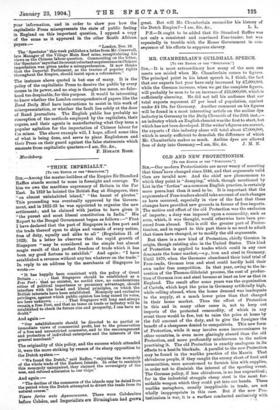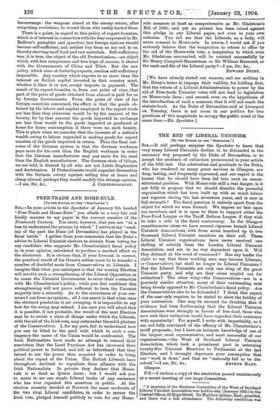[To THE EDITOR OF THE " SPECTATOR."]
then are invalid now. And the chief new phenomenon to which they point is "dumping," which, though mentioned by List in the "forties" as a common English practice, is certainly more prevalent than it used to be. It is important that the arguments of Free-traders should take account of such changes as have occurred, especially in view of the fact that these changes have provided new grounds in favour of free imports.
The motive and effect of the old Protection was the exclusion of imports ; a duty was imposed upon a. commodity, such as corn, which, it was thought, would otherwise have been pro- cured from abroad. This is still the greater part of Protec- tionism, and in regard to this part there is no need to admit that times have changed, or to modify the old arguments.
But there is a new kind of Protection, chiefly Gernian in origin, though existing also in the United States. This kind of Protection is applied to trades which could in any case dominate the home market,—e.g., iron and steel in Germany. Until 1879, when the Germans abandoned their brief trial of Free-trade, German iron and steel could hardly hold their own under free competition. In that year, owing to the in- vention of the Thomas-Gilchrist process, the cost of produc- tion of German iron and steel became at least as low as that in England. The result after some years was the organisation of Cartels, which kept the price in Germany artificially high, while selling abroad, when the home demand was inadequate to the supply, at a much lower price than that charged in their home market. Thus the effect of Protection in this and in many other cases is, not to keep out imports of the protected commodity, of which in any event there would be few, but to raise the price at home by the full amount of the duty, and to give the foreigner the benefit of a cheapness denied to compatriots. This new form of Protection, while it may involve some inconveniences to other countries, is even more glaringly absurd than the old Protection, and more profoundly mischievous to the nation practising it. The old Protection is exactly analogous in its effects to a hostile blockade. A parallel to the new Protection may be found in the warlike practice of the Maoris. That chivalrous people, if they caught the enemy short of food and ammunition, were accustomed to furnish him with supplies, in order not to diminish the interest of the sporting event. The German policy, if less chivalrous, is no less unpractical ; for in the industrial struggle cheap steel is the most for- midable weapon which they could put into our hands. These warlike metaphors, usually inapplicable in trade, are not wholly inappropriate in this cage. But if the new Pro- teetiouism is war, it is a warfare conducted exclusively with
11
There is a point, in regard to this policy of export-bounties, which is of interest in connectionwith the fear (expressed in Mr. Balfour's pamphlet and speeches) lest foreign nations should become self-sufficient, and neither buy from us nor sell to us, thereby starving us of food and raw materials. Self-sufficiency was, it is true, the object of the old Protectionism,—an object which, with less competence and less hope of success, it shared with the Governments of China and Tibet. But the new policy, which aims at fostering exports, renders self-sufficiency impossible. Any country which exports to us more than the interest on British capital invested in that country must, whether it likes it or not, accept imports in payment. The result of its export-bounties is, from our point of view, that part of the price of goods obtained from abroad is paid for us by foreign Governments. From the point of view of the foreign countries concerned, the effect is that the goods ob- tained by the labour and capital employed in the export trade are less than they otherwise would be by the amount of the bounty, for by that amount the goods imported in exchange are less than would be the goods imported or produced at home for home consumption if there were no such bounty. This is plain when we consider, that the increase of a nation's wealth owing to labour expended in making goods for export consists of the goods imported in return. Thus the final out- come of the German system is that the German workman pays more for his corn than the English workman in order that the German manufacturer may pay more for his steel than the English manufacturer. The German state of things, we are told, is desired by all who are not Little Englanders and doctrinaires. If Protectionists would acquaint themselves with the German outcry against selling dear at home and cheap abroad, perhaps they would modify this strange opinion.
—I am, Sir, &c., A CORRESPONDENT.











































 Previous page
Previous page